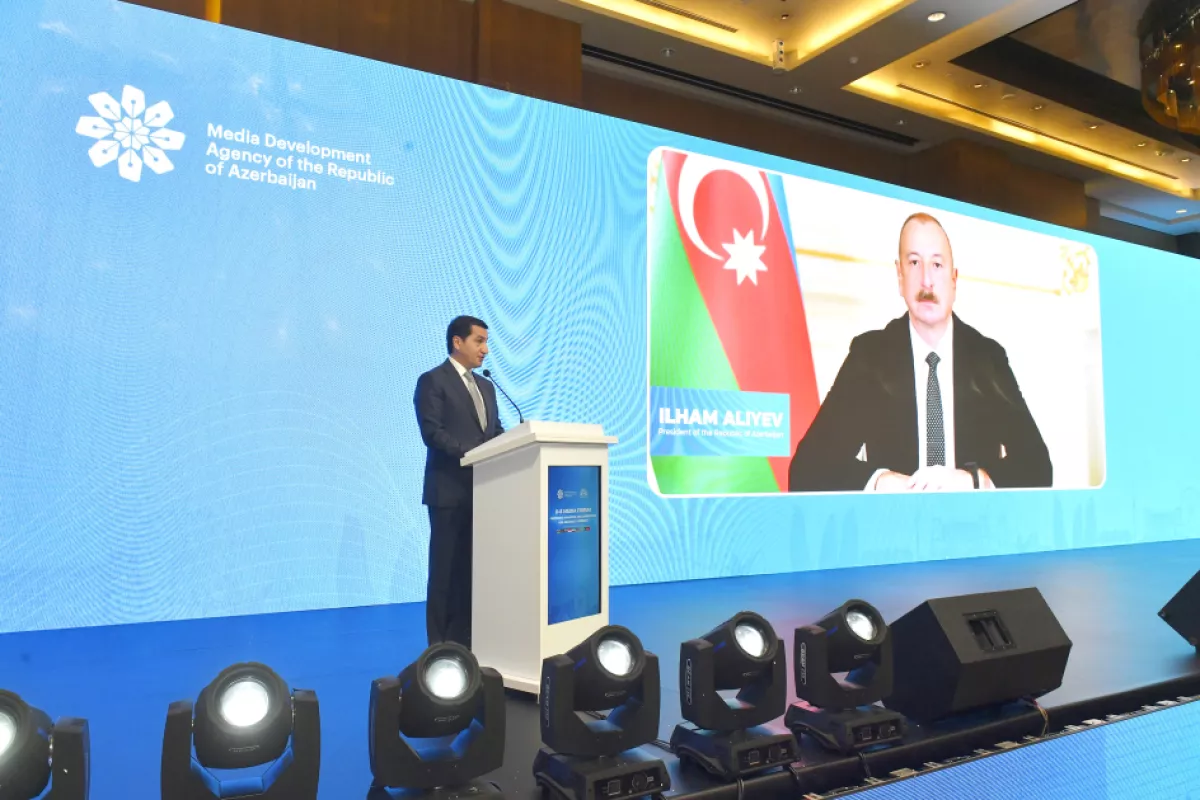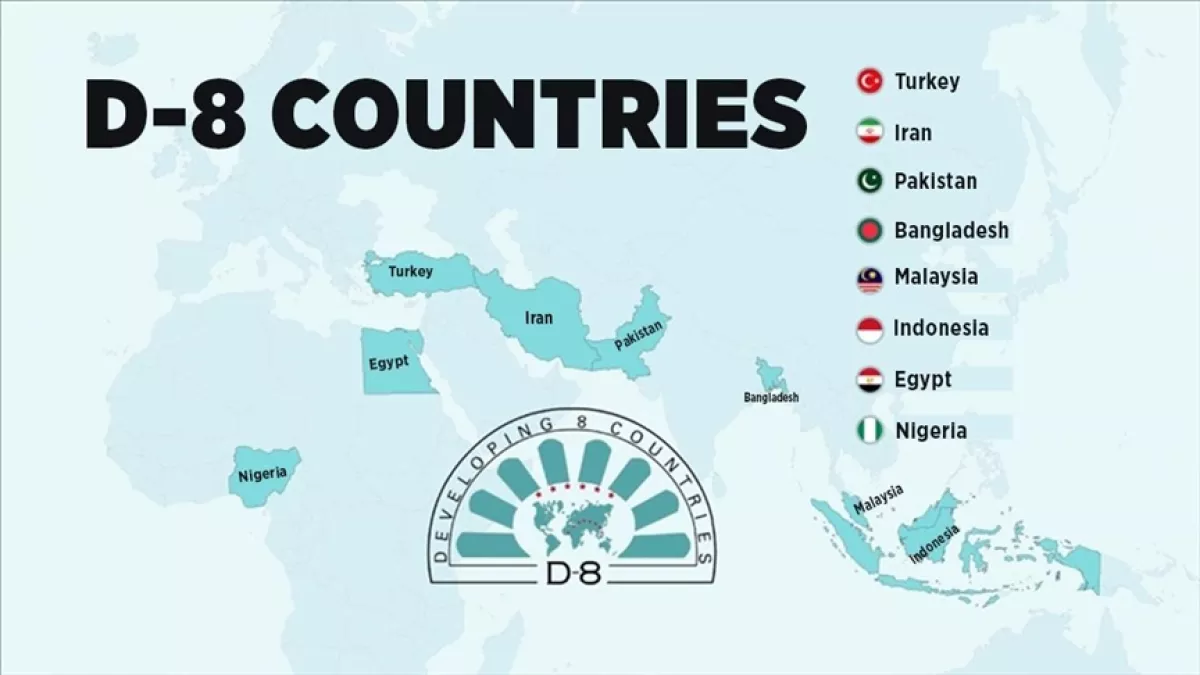Baku builds new media bridge from Asia to Africa D-8 gets a fresh impetus
Today, on Azerbaijan’s initiative, the Media Forum of the Organisation for Economic Cooperation of the Eight Developing Countries (D-8) was held in Baku for the first time under the theme “Fostering Dialogue, Collaboration, and Regional Cohesion.” The event brought together heads of media structures and leading media entities from the D-8 member states, along with high-ranking guests and renowned experts. Around 150 participants attended the forum in the Azerbaijani capital, including seventy-one representatives from the eight countries and the D-8 Secretariat.
At the opening ceremony, Hikmet Hajiyev, Assistant to the President of Azerbaijan and Head of the Foreign Policy Department of the Presidential Administration, read out a message from President Ilham Aliyev to the forum participants, in which the President outlined the directions in which media cooperation among the D-8 states is taking on strategic significance.

During the event, panel sessions were held focusing on journalism, digital innovation, strategic communications, and crisis management, as well as a practical workshop on media ethics in the context of rapid digitalisation and shifting trends.
The significance of what is happening in Baku goes far beyond a professional gathering of media representatives. For the D-8 countries, the media agenda is part of a broader political and economic framework that has been developing around the organisation for nearly three decades.
Background: The D-8 brings together countries with a combined population approaching two billion people. It encompasses a vast territory with enormous human resources, rapidly growing cities, industrial potential, and diverse opportunities in energy, agriculture, trade, and technology.
The idea of creating an Islamic organisation uniting countries from South Asia to Africa was proposed by former Turkish Prime Minister Necmettin Erbakan. In 1996, at a seminar on “Cooperation in Development,” he suggested forming an organisation that would include the largest Muslim-majority countries to support their economic and political development.
Six months later, in June 1997, the Organisation for Economic Cooperation of the Eight Developing Countries (D-8) was established. Its headquarters are located in Istanbul, and its founding members were Bangladesh, Egypt, Indonesia, Iran, Malaysia, Nigeria, Pakistan, and Türkiye.
On 19 December 2024, during the 11th D-8 Summit, the Republic of Azerbaijan was unanimously admitted as a member. This marked the first expansion of the organisation in thirty years, reflecting both trust in Azerbaijan and recognition of the role the country plays at the intersection of diverse economic and political corridors.
For Azerbaijan, participation in the work of the D-8 represents a continuation of its multi-vector diplomacy, which has become a cornerstone of the country’s foreign policy. A clear illustration of this is that, over the past three to four months alone, President Ilham Aliyev has taken part in events of varying formats and across diverse regions. These include the Washington Summit, the EPC Summit in Denmark, the 80th session of the UN General Assembly, the meeting of the Council of Heads of CIS Member States in Dushanbe, and the Middle East Peace Summit in Sharm El-Sheikh, Egypt, which the President attended at the personal invitation of U.S. President Donald Trump and Egyptian President Abdel Fattah el-Sisi.
All of this demonstrates that Azerbaijan operates simultaneously on regional, transregional, and global levels, following a sustainable model in which Baku builds networks of partnerships, strengthens links between different regions, and offers the international community practical solutions. Joining the D-8 clearly fits within Azerbaijan’s multi-faceted foreign policy concept.
In the context of the Media Forum held in Baku, it is worth noting that in his address to the participants, President Ilham Aliyev particularly emphasised the importance of creating platforms where D-8 countries can coordinate their efforts not only in the economic sphere but also in media and communications. In today’s environment, it is precisely the information space that shapes the pace of rapprochement between states, forms public perceptions of partnerships, and influences the stability of political and economic projects. Media today have the power to break down stereotypes, open new avenues for cooperation, protect their countries from manipulation, and contribute to the development of more resilient ties between societies.

The potential of the D-8 in this sphere is enormous. Each member state possesses a large audience, dynamic information platforms, growing digital ecosystems, and a young generation of journalists and content creators. Harnessing this potential collectively could turn the D-8 into one of the most influential media networks in Eurasia. The Baku initiative to create a media platform is clearly intended to play a leading role in this process, providing opportunities to share experience, establish standards, cultivate a common culture of information exchange, and strengthen professional ties. Importantly, this platform is proposed not as a formal body but as a mechanism for practical work — including training, technology transfer, joint projects, and a unified vision of what responsible journalism means in an era of digital transformation.
The agenda of the Media Forum in Baku included discussions on models that would enable D-8 countries to engage more confidently with international audiences, shape their own narratives, and convey their positions to the world. States with a combined population approaching two billion, as noted earlier, cannot afford to remain in the shadow of other countries’ information frameworks. They require their own public diplomacy tools, modernised platforms for strategic communications, and contemporary media cooperation infrastructure. This is why issues such as digital innovation, media ethics, crisis management, and the creation of sustainable communication models were at the centre of discussions in Baku.
In this context, Azerbaijan plays not only the role of host but also that of an initiator. The country demonstrates the ability to create platforms that connect different regions and generate a qualitatively new dynamic in their interactions. Azerbaijan’s internal confidence, reliance on its economic potential, successful diplomatic initiatives, and strengthened international standing form the foundation that makes the country an attractive venue for such forums. It is in the capital of Azerbaijan that decisions are being made which influence the information architecture of multiple regions — from the Middle East to Southeast Asia and Africa.








